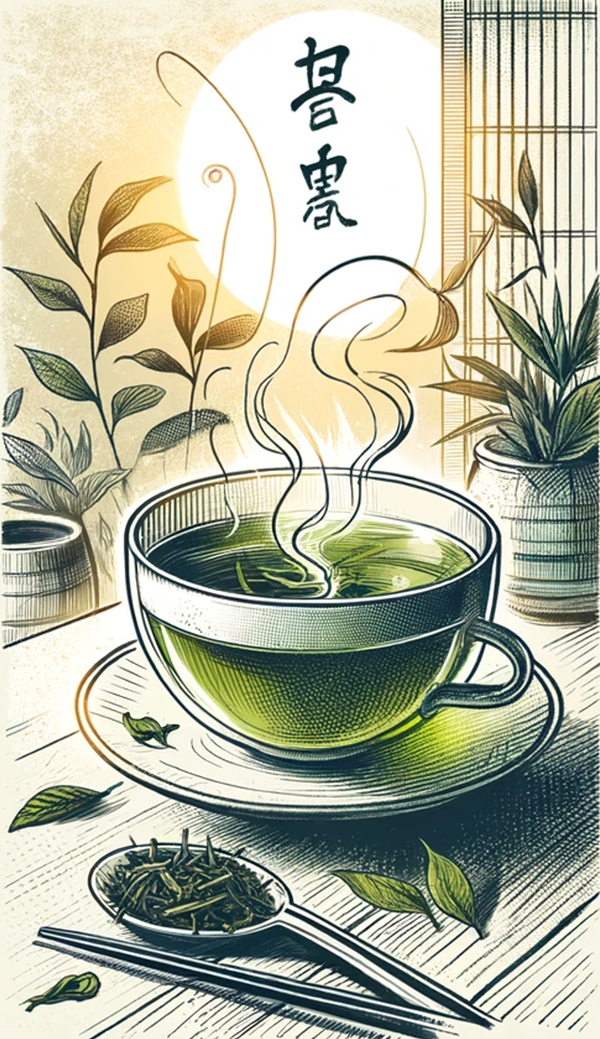Green Gold: Discover the World of Green Tea Benefits

Green tea, often hailed as "Green Gold," is more than just a soothing beverage; it's a rich tapestry of history, culture, and health benefits. This timeless drink, originating from the verdant hills of East Asia, has become a global phenomenon, celebrated for its subtle flavors and profound health advantages.
The Art of Preparing Green Tea: Secrets of the Perfect Taste
The journey to the perfect cup of green tea starts with understanding its delicate nature. The art of brewing green tea lies in the balance of temperature and timing. Ideally, water should be heated to 80-85°C (176-185°F), and the leaves should steep for 2-3 minutes, ensuring the release of flavors without extracting bitter tannins. This precision reveals the tea’s nuanced taste, a harmonious blend of sweet and earthy notes.

Types of Green Tea: Your Guide to Choosing and Tasting
The world of green tea is vast and varied, with each type offering a unique profile of flavors and benefits. From the vegetal freshness of Sencha to the creamy richness of Matcha, and the smoky depth of Gunpowder, the diversity of green tea caters to every palate. Understanding these types allows connoisseurs and casual drinkers alike to navigate the green tea landscape, selecting varieties that resonate with their taste preferences and health goals.
Green Tea: Effect of Temperature and Steeping Time
The essence of green tea’s flavor and health properties is significantly influenced by the water temperature and steeping duration. Too hot or too long, and the tea becomes overly bitter; too cool or too short, and it remains underdeveloped. This delicate balance is crucial for extracting the tea’s full spectrum of flavors and antioxidants, embodying the art and science of tea brewing.
Distinctive Additions to Green Tea: From Herbs to Fruits
Green tea’s versatility extends to its compatibility with a range of additions that enhance its flavor and health benefits. Incorporating herbs like mint or basil, fruits such as lemon or peach, or even spices like ginger or cinnamon, can transform the basic green tea into a delightful concoction, adding layers of flavor and therapeutic benefits.
Selecting and Storing Green Tea Leaves for High Quality
The selection and storage of green tea leaves are pivotal in preserving their quality and essence. Opting for leaves that are vibrant green and aromatic indicates freshness and quality. Proper storage in airtight containers away from light, moisture, and odors helps maintain their potency and flavor profile, ensuring an exceptional tea-drinking experience.
Ingredients of Green Tea
Green tea is a treasure trove of health-promoting compounds, including powerful antioxidants like catechins, which are key to its anti-inflammatory and metabolic benefits. Additionally, it contains amino acids, such as L-theanine, which promotes relaxation and focus, making green tea a beverage of both tranquility and vitality.
Green Tea and Cancer
The potential of green tea in cancer prevention has been a focus of scientific research, with studies suggesting its antioxidants, particularly epigallocatechin gallate (EGCG), may inhibit cancer cell growth. While research is ongoing, the association between green tea consumption and reduced cancer risk highlights its role in a healthy lifestyle.
History of Green Tea
Tracing back thousands of years, the history of green tea is as rich and complex as its flavor. Originating in China, it was initially consumed for medicinal purposes before evolving into a daily beverage. Its spread across Asia and later to the West has made it a global symbol of wellness and tradition, steeped in centuries of history.

Origins of the Green Tea Plant
The green tea plant, Camellia sinensis, thrives in the mist-covered hills of East Asia. The climate, soil, and altitude of its native regions play a crucial role in cultivating the unique characteristics of green tea, from its delicate flavor to its array of health benefits.
Green Tea Production
From the tender plucking of young leaves to the careful drying and rolling, the production of green tea is an intricate process that preserves its freshness, aroma, and nutritional content. This meticulous craftsmanship ensures that each cup of green tea offers a sensory and healthful experience.
Benefits of Green Tea for Men
Research indicates that green tea may offer particular health benefits for men, including supporting heart health and potentially reducing the risk of prostate cancer. Its anti-inflammatory properties and antioxidants contribute to overall wellness, making it a valuable addition to a balanced diet.
Health Benefits of Green Tea
Celebrated for its extensive health benefits, green tea is known to enhance cognitive function, aid in weight management, and reduce the risk of chronic diseases like heart disease and diabetes. Its rich antioxidant content supports overall health, making it a wise choice for those seeking a healthful beverage.
Green Tea in Cultures
Green tea's significance transcends its health benefits, holding a revered place in many cultures, especially in East Asia. It is central to social rituals, ceremonies, and daily life, symbolizing purity, harmony, and respect.

Prepare a Perfect Cup of Green Tea
Achieving the perfect cup of green tea is a rewarding endeavor that combines tradition with personal taste. It involves selecting quality leaves, mastering the brewing technique, and savoring the resulting brew, which is both a health elixir and a cultural experience.
FAQ on Green Tea
- What is green tea?
A delicate beverage made from the unfermented leaves of Camellia sinensis, green tea is celebrated for its subtle flavor and health benefits.
- Does green tea contain caffeine?
Yes, green tea contains caffeine, and its strength varies from one type to another and depending on the method of preparation, providing a nice boost of energy.
- Can green tea help with weight loss?
Green tea has been associated with weight loss, as it can enhance metabolic rate and fat oxidation.
- Are there side effects of drinking green tea?
In moderation, green tea is safe for most people, though excessive consumption can lead to caffeine-related side effects.
- Can children drink green tea?
Children can consume green tea in small amounts, considering its caffeine content and their overall diet.
- Does green tea contain vitamin C?
Yes, green tea contains vitamin C, adding to its antioxidant profile and health benefits. It's important to note that the vitamin C content in green tea decreases significantly and affected by the preparation temperature.
- Can green tea supplements be taken?
Green tea supplements offer an alternative way to obtain the benefits of green tea but should be used under medical advice to ensure safety and efficacy.
For more insights into the world of green tea, its varieties, and its cultural significance, visit [ُTaolefah Green Tea Collection]. Additionally, explore the [types of tea] to discover the diversity and richness of tea.
Green tea, with its rich heritage and multitude of health benefits, provides not just a beverage, but an experience that touches on wellness, history, and the joy of a well-brewed cup.


